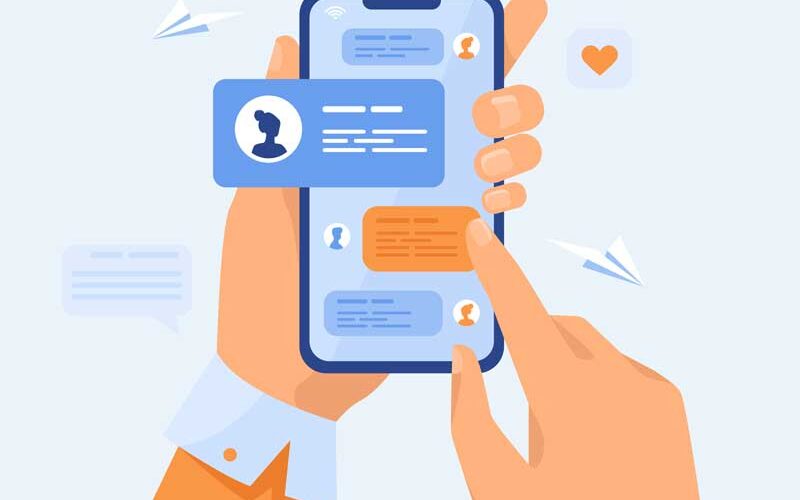How has the smartphone changed our lives?
The advent of smartphones has changed our lives a lot. The device provided people with unprecedented experience and convenience. People are now so dependent on smartphones that they cannot live without them (Roy, 2020).
- Quick connections
The main purpose of using a cell phone is to contact other people, regardless of distance. Smartphones can connect more quickly to other people through various apps, text messages, and phone calls (Roy, 2020).
- Knowledge storehouse
Smartphones have internet access. Therefore, when a problem occurs, people can immediately find a smart solution through their smartphones. People can study various fields, such as language, math, and history, for free through apps (Roy, 2020).
- Emergency services
The global positioning system (GPS) on smartphones helps track people’s locations. People can use their smartphones to call for help in medical emergencies (Roy, 2020).
- Entertainment
Countless apps on smartphones allow people to enjoy various types of entertainment. People can enjoy games, listen to music, watch movies, and exercise through apps (Roy, 2020).
Changes in brain structure and function induced by smartphones
Excessive use of smartphones can change brain structure or function. In particular, in children and adolescents whose brains are still developing while frequently exposed to smartphones, the cerebral cortex becomes thinner and negatively affects frontal lobe formation. The frontal lobe is in charge of concentration, thinking, problem-solving ability, sociality, emotion control, and control. However, excessive use of smartphones can prevent the development of the frontal lobe (PANJWANI, 2022).
In addition, excessive use of smartphones is related to cognitive plasticity in the brain. People use smartphones to multi-task, such as work, study, watch TV, and clean. People who multitask can have poor concentration and memory. The brain has a limited amount of information it can accept and process. Therefore, if people try to do several things at once, it is hard to concentrate (PANJWANI, 2022).
Smartphone addiction changes the mechanisms of the brain. Addicted brains are associated with dopamine secretion. Dopamine is secreted when people feel emotions such as joy or pleasure. However, in addition to natural compensation, dopamine is secreted through artificial compensation such as drugs and alcohol. If artificial compensation is provided gradually rather than abruptly, dopamine production is insufficient, resulting in psychological and physical withdrawal symptoms such as anxiety. The brain, accustomed to artificial rewards, does not feel much joy or pleasure from natural compensation. Smartphone addiction is also one of these artificial rewards. Like drugs and alcoholism, this accompanies changes in brain mechanisms, so it can be difficult to solve simply through changes in will and lifestyle (PANJWANI, 2022).
The danger of digital dementia
High dependence on electronic devices can cause digital dementia. Modern technology hinders the development of the brain, restricting the memory of information. People can lose their creative thinking skills and be negatively affected by memory loss and carelessness. Also, if you look down at the screen for a long time, you will have a bent posture. This posture can contribute to digital dementia symptoms by limiting blood flow to the brain and oxygen supply (Hakim, 2017).
Usually, digital dementia has a high risk of developing in adults and adolescents who spend a lot of time using electronic devices. Symptoms of digital dementia include reduced memory and concentration (Hakim, 2017).
How can we prevent smartphone addiction?
- Set up rules for using the smartphone
Establishing rules to distance yourself from your smartphone is very helpful in preventing addiction. You can set rules such as not using a smartphone before or after work. If physical access becomes difficult by intentionally limiting the time to use a smartphone, the usage will naturally decrease (Sneed, 2022).
- Focus on offline life
People use smartphones more when they are alone. Through smartphones, people try to fill emptiness, loneliness, and boredom. Focusing on offline activities, such as walking, reading, and meeting friends will naturally reduce the time people use their smartphones (Sneed, 2022).
- Regular app relocation
Periodically rearranging apps on your smartphone is one way. Relocated apps become hard to find. It helps reduce the behavior of simply checking your smartphone habitually (Sneed, 2022).
Conclusion
Smartphones have already become an important part of people’s lives. Now, it is hard to imagine a life without smartphones. Generations that have experienced the digital world since birth find it more difficult to imagine a life without digital devices. To live a healthy life with a smartphone, we need to be aware of the impact of this device on our brains. It is clear that excessive use of smartphones negatively affects the brain. Therefore, it is important to try to make healthy smartphone usage habits.
References
Hakim, T. (2017). Digital Dementia: The Silent Effects of Technology. [online] blog.caregiverasia.com. Available at: https://blog.caregiverasia.com/digital-dementia-the-silent-effects-of-technology [Accessed 17 November 2022].
PANJWANI, S. (2022). Are smartphones changing our brains? Science has the answer. [online] Fast Company Middle East | The future of tech, business and innovation. Available at: https://fastcompanyme.com/technology/are-smartphones-changing-our-brains-science-has-the-answer/ [Accessed 17 November 2022].
Roy, T. (2020). 12 Ways How Mobile Has Changed Our Life. [online] Medium. Available at: https://medium.com/swlh/12-ways-how-mobile-has-changed-our-life-61d4cf03efe0 [Accessed 17 November 2022].
Sneed, A. (2022). I’m Addicted to My Phone. How Can I Cut Back? The New York Times. [online] 8 Feb. Available at: https://www.nytimes.com/2022/02/08/well/live/smartphone-addiction-tips.html [Accessed 17 November 2022].
